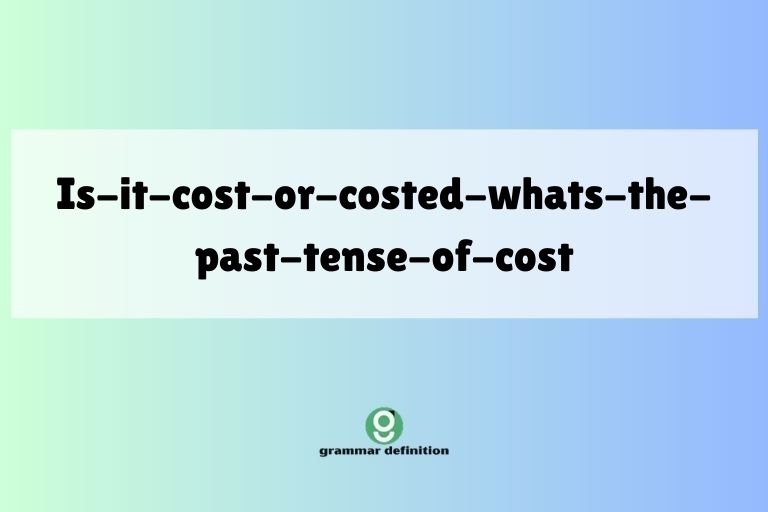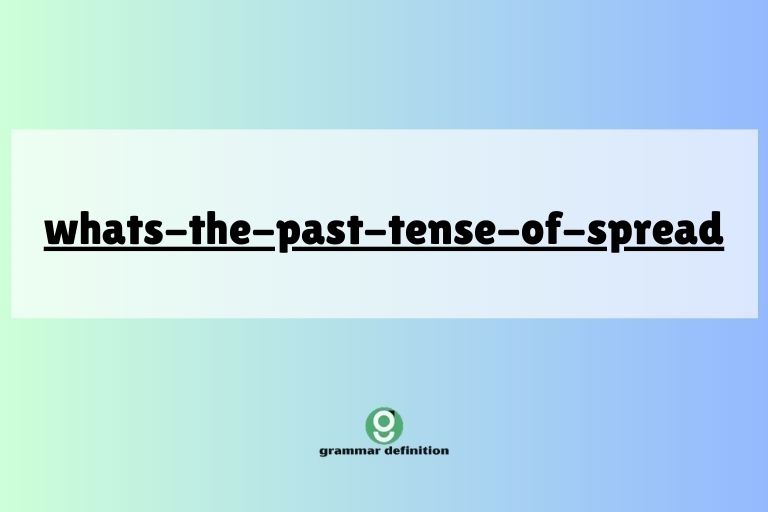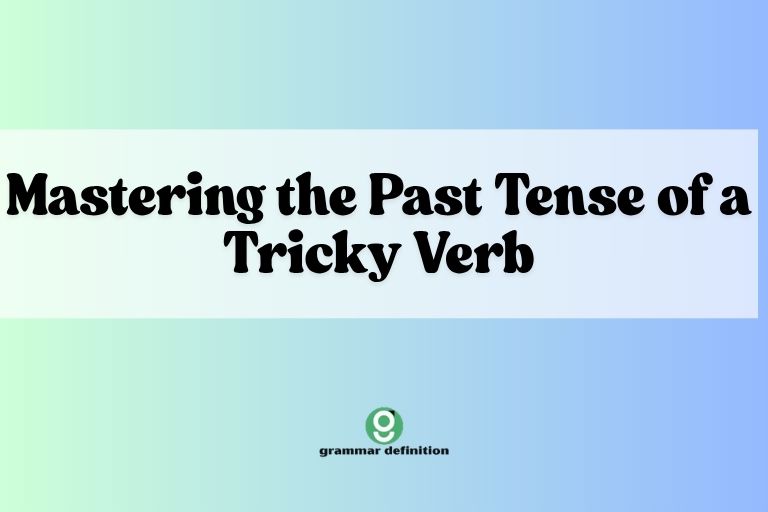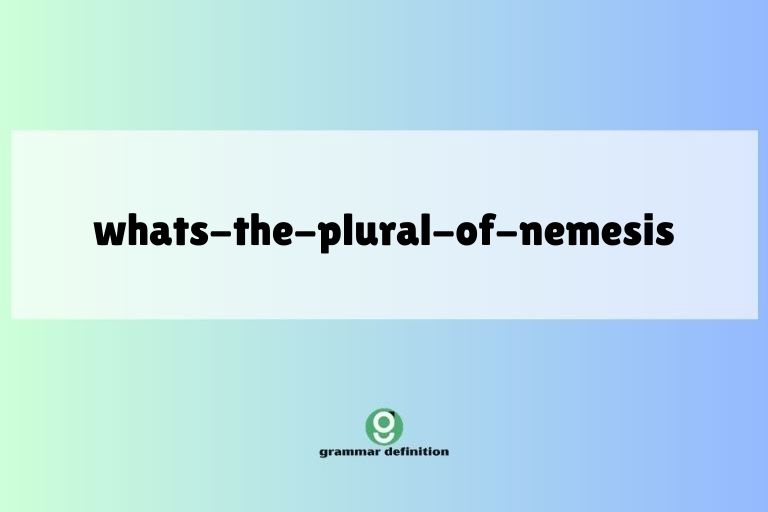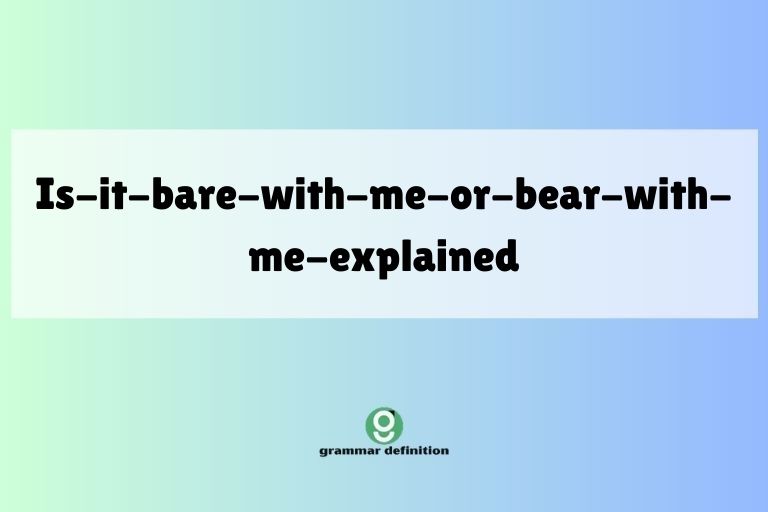Beyond “Have a Good Day”: Diverse Ways to End Conversations
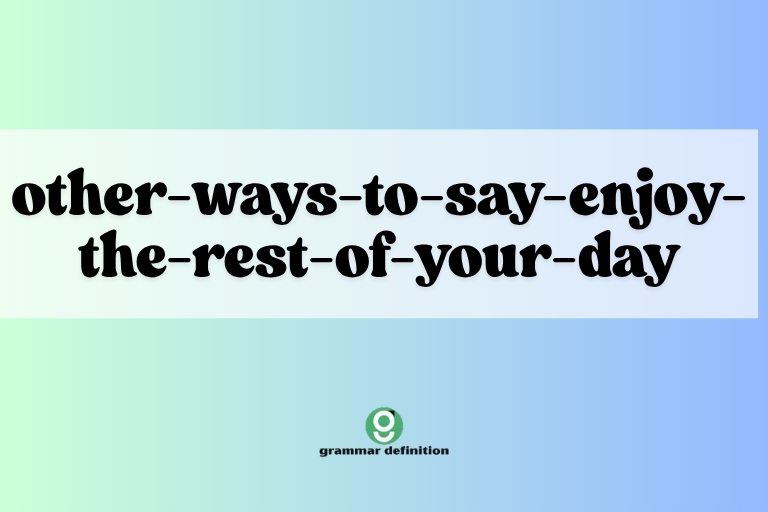
Mastering alternative ways to say “Have a good day” enhances your communication skills, making you sound more polite, considerate, and adaptable in various social and professional settings. This skill is especially useful for English language learners who wish to expand their vocabulary and understanding of conversational nuances.
This article explores a variety of expressions with similar meanings, providing definitions, examples, usage rules, and practice exercises. Whether you’re aiming to improve your business communication, casual conversations, or written correspondence, this guide will equip you with the knowledge and tools to express well wishes effectively.
Table of Contents
- Introduction
- Definition and Context
- Structural Breakdown
- Types and Categories
- Examples
- Usage Rules
- Common Mistakes
- Practice Exercises
- Advanced Topics
- FAQ
- Conclusion
Definition and Context
The phrase “Have a good day” is a common expression used to convey well wishes to someone as a form of farewell or to express positive intent for the remainder of their day. The alternatives to this phrase serve the same function but can add variety, sincerity, or a more tailored sentiment to the interaction.
These phrases are used to conclude conversations, end emails, or simply offer a kind wish to someone you encounter. Understanding the nuances of these alternatives allows you to communicate more effectively and appropriately in different contexts.
They can range from formal expressions suitable for professional environments to casual remarks perfect for friends and family.
These alternative phrases are essential for maintaining polite and engaging conversations. They show consideration for the other person’s well-being and can leave a positive lasting impression.
Choosing the right phrase depends on the relationship with the other person, the context of the conversation, and the desired level of formality. By expanding your repertoire of such expressions, you can avoid sounding repetitive and demonstrate a greater command of the English language.
Structural Breakdown
The structure of these alternative phrases generally follows a simple pattern: an introductory phrase expressing a wish or hope, followed by a specific reference to the remaining part of the day or a future activity. Many phrases use verbs like “hope,” “enjoy,” or “have” followed by a noun phrase that describes the desired experience or outcome.
Some phrases are more direct, using imperative verbs to instruct or encourage a certain behavior. The key is to choose a structure that aligns with the intended tone and context.
Here’s a breakdown of common structural elements:
- Verb + Adjective + Noun: This is a classic structure, such as “Have a great day” or “Enjoy a pleasant evening.”
- Hope + Subject + Verb: This structure expresses a desire for a positive outcome, like “Hope you have a wonderful time” or “Hope you find what you’re looking for.”
- Imperative Verb: These phrases use a direct command or suggestion, such as “Take care” or “See you later.”
- Wish + Subject + Verb: Similar to “hope,” this structure expresses a desire, like “Wish you all the best” or “Wish you a safe journey.”
Types and Categories
The various alternatives to “Have a good day” can be categorized based on formality and context. Understanding these categories can help you choose the most appropriate phrase for any situation.
Formal Settings
In formal settings, such as business meetings or interactions with superiors, it is important to use expressions that convey respect and professionalism. These phrases are generally more polite and less casual than those used in informal settings.
Formal expressions often include phrases like “I hope you have a productive day” or “I wish you a successful afternoon.”
Informal Settings
Informal settings, such as conversations with friends and family, allow for more casual and relaxed expressions. These phrases can be more personal and friendly, such as “Have a good one” or “Enjoy your evening.” Slang and colloquialisms may also be appropriate in these contexts.
Business Settings
Business settings require a balance of formality and friendliness. Phrases like “Have a great meeting” or “I hope you have a successful presentation” are appropriate.
It’s important to be professional while still conveying warmth and sincerity. These phrases often relate specifically to the business context.
Written Communication
Written communication, such as emails or letters, also requires careful consideration of the appropriate closing. Formal emails may end with “Sincerely” or “Best regards,” while informal emails may use phrases like “Cheers” or “Talk to you soon.” The closing should match the tone and purpose of the message.
Examples
Here are several examples of alternative phrases to “Have a good day,” categorized by their general usage. These examples provide a comprehensive overview of the various ways to express well wishes in English.
General Well Wishes
These phrases are suitable for a wide range of situations and can be used with both acquaintances and close friends. They express a general desire for the other person’s well-being.
The following table provides 30 examples of general well wishes to use in place of “Have a good day.”
| Phrase | Context |
|---|---|
| Have a great day! | General, positive |
| Have a wonderful day! | Slightly more enthusiastic |
| Have a pleasant day! | Formal, polite |
| Have a good one! | Casual, friendly |
| Enjoy your day! | Encouraging, positive |
| Take care! | Caring, concerned |
| All the best! | Formal, sincere |
| Have a nice day! | Simple, common |
| Have a lovely day! | Charming, friendly |
| Have a fantastic day! | Enthusiastic, positive |
| Have a super day! | Informal, playful |
| Have a brilliant day! | British English, positive |
| Have a smashing day! | British English, informal |
| Have a good one! | Casual, versatile |
| Have a blessed day! | Religious, sincere |
| Have a safe day! | Concerned, protective |
| Have a productive day! | Business, encouraging |
| Have a fulfilling day! | Encouraging, meaningful |
| Have a relaxing day! | Encouraging, if they’re off work |
| Have a stress-free day! | Empathetic, considerate |
| Have a fun-filled day! | Playful, optimistic |
| Have a cheerful day! | Positive, uplifting |
| Have a dynamic day! | Energetic, motivating |
| Have a peaceful day! | Calm, serene |
| Have an excellent day! | Formal, positive |
| Have a marvelous day! | Enthusiastic, delightful |
| Have a grand day! | Traditional, expressive |
| Have a splendid day! | Formal, elegant |
| Have a terrific day! | Informal, upbeat |
| Have a top-notch day! | Modern, encouraging |
Activity-Specific Wishes
These phrases are tailored to the specific activities or plans that the other person has for the day. They show that you are attentive and interested in their life.
The following table provides 30 examples of activity-specific well wishes to use in place of “Have a good day.” These are perfect when you know what someone is doing.
| Phrase | Context |
|---|---|
| Have a good meeting! | Before a meeting |
| Enjoy your lunch! | Before lunchtime |
| Have a great workout! | Before exercising |
| Have a fun trip! | Before traveling |
| Enjoy your vacation! | Before a vacation |
| Have a productive session! | Before a work session |
| Have a successful presentation! | Before a presentation |
| Have a good game! | Before a sports game |
| Enjoy the movie! | Before watching a movie |
| Have a great time at the party! | Before a party |
| Have a wonderful dinner! | Before dinner |
| Enjoy the concert! | Before a concert |
| Have a good class! | Before a class |
| Have a great practice! | Before a practice session |
| Enjoy the show! | Before a show |
| Have a good interview! | Before an interview |
| Enjoy your date! | Before a date |
| Have a successful surgery! | Before a surgery (to family) |
| Have a good sale! | Before a sales event |
| Have a great performance! | Before a performance |
| Enjoy the festival! | Before a festival |
| Have a good round! | Before a round of golf |
| Have a great swim! | Before swimming |
| Enjoy your hike! | Before hiking |
| Have a good ride! | Before a bike ride |
| Have a great run! | Before running |
| Enjoy your read! | Before reading |
| Have a productive study session! | Before studying |
| Have a successful launch! | Before launching something |
| Enjoy your appointment! | Before an appointment |
Future Plans
These phrases acknowledge future plans and express a desire for a positive outcome. They are often used when you know the other person has something important or exciting coming up.
The following table provides 20 examples of phrases related to future plans to use in place of “Have a good day.”
| Phrase | Context |
|---|---|
| Hope you have a great weekend! | Towards the end of the week |
| Hope you have a wonderful vacation! | Before a vacation |
| Looking forward to seeing you again! | Expressing anticipation |
| See you soon! | If you plan to meet again shortly |
| Talk to you later! | If you plan to speak again soon |
| Catch you later! | Informal, friendly |
| Hope to see you again soon! | Expressing a desire to meet again |
| Until next time! | Formal, indicating a future meeting |
| Have a good evening! | Towards the end of the day |
| Have a good night! | Before bedtime |
| Hope you sleep well! | Before bedtime |
| Have a safe trip home! | Before someone departs |
| Safe travels! | Before a journey |
| Hope everything goes well! | Before an important event |
| Fingers crossed for you! | Expressing hope for success |
| Knock ’em dead! | Informal, encouraging success |
| Best of luck! | Formal, wishing success |
| Wish you all the best! | Sincere, wishing well |
| Hope you have a relaxing evening! | Before an evening off |
| Hope you enjoy the rest of your week! | General, wishing well for the week |
Usage Rules
When using alternative phrases to “Have a good day,” it is important to consider the following rules:
- Formality: Choose a phrase that matches the level of formality of the situation.
- Context: Tailor your phrase to the specific context and activities of the other person.
- Sincerity: Ensure that your phrase is genuine and reflects your true feelings.
- Relationship: Consider your relationship with the other person when choosing a phrase.
- Culture: Be aware of cultural differences and sensitivities when using certain phrases.
Important Note: Some phrases may be more appropriate in certain regions or cultures. It is always a good idea to be mindful of these differences to avoid misunderstandings or offense.
Common Mistakes
Here are some common mistakes to avoid when using alternative phrases to “Have a good day”:
| Incorrect | Correct | Explanation |
|---|---|---|
| “Have a good!” | “Have a good one!” | Missing the “one” makes the phrase incomplete. |
| “Enjoy to your day!” | “Enjoy your day!” | The preposition “to” is unnecessary. |
| “Take a good day!” | “Have a good day!” or “Take care!” | “Take a good day” is not a standard expression. |
| “Hope you will good!” | “Hope you are well!” | “Will good” is grammatically incorrect. |
| “All best for you!” | “All the best to you!” or “Best of luck!” | “All best for you” is grammatically incorrect. |
| “See you!” (without context) | “See you later!” or “See you soon!” | “See you!” alone can sound abrupt. |
| “Wish you a well!” | “Wish you well!” | “A well” is not the correct usage in this context. |
| “Have a greatly day!” | “Have a great day!” | “Greatly” is an adverb, but “great” (adjective) is needed here. |
| “Hope you have a nicely day!” | “Hope you have a nice day!” | “Nicely” is an adverb, but “nice” (adjective) is needed here. |
| “Enjoy yourself to the party!” | “Enjoy yourself at the party!” | The preposition “to” is incorrect here. |
Practice Exercises
Test your understanding with these practice exercises. Each exercise focuses on different aspects of using alternative phrases to “Have a good day.”
Exercise 1: Matching
Match the phrases with their appropriate contexts.
| Phrase | Context | Answer |
|---|---|---|
| 1. Have a productive day! | A. Before a vacation | 1. B |
| 2. Enjoy your vacation! | B. Before a work day | 2. A |
| 3. Take care! | C. Ending a phone call with a friend | 3. C |
| 4. Best of luck! | D. Before an important exam | 4. D |
| 5. See you soon! | E. Ending a conversation with a colleague you will see next week | 5. E |
| 6. Have a good meeting! | F. Before an important meeting | 6. F |
| 7. Have a safe flight! | G. Before someone boards a plane | 7. G |
| 8. Enjoy your meal! | H. Before someone starts eating | 8. H |
| 9. Have a great time! | I. Before someone goes to a party | 9. I |
| 10. Have a good one! | J. Ending a casual conversation with a store clerk | 10. J |
Exercise 2: Fill in the Blanks
Complete the sentences with the appropriate phrase.
| Sentence | Correct Answer |
|---|---|
| 1. I hope you __________ at the concert tonight! | have a great time |
| 2. __________ on your interview tomorrow! | Best of luck |
| 3. __________; it was nice talking to you. | Take care |
| 4. I’m looking forward to __________ again soon. | seeing you |
| 5. __________ on your presentation! | Have a successful presentation |
| 6. I hope you __________ well tonight. | sleep |
| 7. __________ with your new project! | All the best |
| 8. __________ on your trip! | Safe travels |
| 9. __________ at the conference! | Have a productive day |
| 10. __________ for the rest of the week. | Enjoy the rest of your week |
Exercise 3: Sentence Completion
Choose the best phrase to complete the following sentences.
| Question | Options | Answer |
|---|---|---|
| 1. Before leaving the office for the day, you say to your colleague: “__________” | A) Have a good one! B) See you never! C) Go away! | A) Have a good one! |
| 2. When your friend is about to start their vacation, you say: “__________” | A) Have a terrible time! B) Enjoy your vacation! C) Stay home! | B) Enjoy your vacation! |
| 3. As you end a phone call with your grandmother, you say: “__________” | A) Goodbye forever! B) Take care! C) I hate you! | B) Take care! |
| 4. Before your sister goes into a job interview, you say: “__________” | A) Fail miserably! B) Best of luck! C) Be awful! | B) Best of luck! |
| 5. When saying goodbye to a coworker you’ll see next week, you say: “__________” | A) See you soon! B) Never return! C) I’m ignoring you! | A) See you soon! |
| 6. Before someone starts eating their lunch, you say: “__________” | A) Spoil your appetite! B) Enjoy your meal! C) Have a horrible lunch! | B) Enjoy your meal! |
| 7. As someone boards a plane, you say: “__________” | A) Have a safe flight! B) Crash and burn! C) Get lost! | A) Have a safe flight! |
| 8. Before someone goes to sleep, you say: “__________” | A) Have nightmares! B) I hope you sleep well! C) Stay awake all night! | B) I hope you sleep well! |
| 9. When ending a formal email, you write: “__________” | A) Goodbye! B) Best regards! C) See ya! | B) Best regards! |
| 10. As you leave a store after making a purchase, you say to the cashier: “__________” | A) Have a bad day! B) Have a good one! C) I hope you get fired! | B) Have a good one! |
Advanced Topics
For advanced learners, there are additional nuances to consider when using alternative phrases to “Have a good day.” These include cultural sensitivity and regional variations.
Cultural Sensitivity
Certain phrases may be more appropriate in some cultures than others. For example, expressions of religious sentiment, such as “Have a blessed day,” may be more common in some communities than others.
It is important to be mindful of these cultural differences to avoid causing offense or discomfort.
Regional Variations
The English language has many regional variations, and certain phrases may be more common in some regions than others. For example, “Have a smashing day” is more common in British English than in American English.
Being aware of these regional variations can help you communicate more effectively with people from different parts of the world.
FAQ
Here are some frequently asked questions about alternative ways to say “Have a good day”:
- Q: Is it always necessary to say “Have a good day” or an alternative?
A: No, it is not always necessary, but it is generally considered polite to offer some form of well wish when ending a conversation or interaction. The specific phrase you use depends on the context and your relationship with the other person.
- Q: Can I use slang or informal phrases in professional settings?
A: It is generally best to avoid slang or overly informal phrases in professional settings. Stick to more formal and polite expressions to maintain a professional image.
- Q: How can I make my well wishes sound more sincere?
A: Make eye contact, smile, and speak in a warm and friendly tone. Tailor your phrase to the specific situation and show genuine interest in the other person’s well-being.
- Q: What if I don’t know what the other person is doing for the rest of the day?
A: In this case, a general well wish, such as “Have a good one” or “Take care,” is perfectly appropriate.
- Q: Are there any phrases I should avoid using?
A: Avoid phrases that could be interpreted as sarcastic, insincere, or negative. Also, avoid phrases that are overly personal or intrusive.
- Q: How do I respond when someone says “Have a good day” to me?
A: A simple “Thank you, you too!” is a polite and appropriate response. You can also add a more specific response, such as “Thank you, I hope you have a great day as well!”
- Q: Is it okay to use the same phrase repeatedly?
A: While using the same phrase is acceptable, varying your expressions can make you sound more engaging and considerate. This article provides many alternatives to keep your conversations fresh.
- Q: How important is body language when saying these phrases?
A: Body language is very important. Sincerity is conveyed not just through words but also through your facial expressions and posture. Maintain eye contact and smile to show you mean what you say.
Conclusion
Learning alternative ways to say “Have a good day” can significantly enhance your communication skills and make you sound more polite, considerate, and adaptable in various settings. By understanding the nuances of formality, context, and cultural sensitivity, you can choose the most appropriate phrase for any situation.
Remember to practice these phrases in your daily conversations to become more comfortable and confident in your use of English. This skill is invaluable for building positive relationships and making a lasting impression.
Expanding your vocabulary and understanding of conversational nuances is an ongoing process. Continue to explore different expressions and pay attention to how native speakers use them in various contexts.
With practice and attention to detail, you can master the art of expressing well wishes effectively and enhance your overall communication skills. Keep practicing, and you’ll find yourself using these phrases naturally and confidently.

